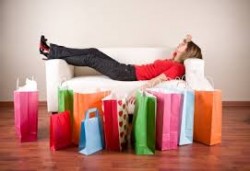Signs of Compulsive Shopping Disorder
Someone who obsesses over shopping and buying new things may well be struggling with a compulsive shopping disorder. According to World Psychiatry, compulsive shopping disorder affects an estimated 5.8 percent of the U. S. population with 80 percent of compulsive shoppers made up of women.
While not classified as an actual personality disorder, signs associated with compulsive shopping disorder meet the criteria for the Axis II personality disorder category. Signs of the compulsive shopping disorder appear within a person’s emotional responses, daily routines and behaviors as well as in what he or she does to continue indulging in this type of behavior.
Phases of Compulsive Shopping Disorder
While the criteria for compulsive shopping disorder closely matches that of a personality disorder, the phases associated with this condition bear a strong resemblance to addiction. Those affected move through four distinct phases of compulsive shopping behavior:
- Anticipating the act of shopping
- Preparing to shop
- Shopping
- Paying for the purchase
Compulsive shoppers devote a considerable amount of time and energy to carrying out these behaviors, oftentimes at the expense of other important areas of their lives.
Emotional Responses

Compulsive buying is an impulse control disorder.
As with any type of obsession, compulsive shoppers connect with shopping on an emotional level. Someone affected by compulsive shopping disorder experiences distinct emotions within each phase of the activity.
- Phase 1 – feelings of anxiety and tension as a person anticipates shopping
- Phase 2 – drive, determination and focus dedicated to researching the sought after item, deciding on how to pay for it (cash vs. credit) and scheduling time for the event
- Phase 3 – exhilaration and excitement, possibly even bringing about sexual feelings
- Phase 4 – feeling a sense of let down and/or disappointment in one’s behavior
This same array of emotional responses occurs for people who struggle with alcohol and drug addictions.
Shopping Behaviors
More oftentimes than not, a compulsive shopper will shop alone or possibly with friends who share the same affliction. In effect, shopping is a private pleasure that can potentially embarrass a person in the eyes of someone who doesn’t share the same obsession.
While spending money is a big part of compulsive shopping disorder, income (or lack thereof) doesn’t deter compulsive shopping behaviors for people affected by it. Instead, income level will dictate where a person shops, such as at thrift stores and consignment shops versus department stores.
Someone with limited financial resources may veer more so towards buying in bulk and buying on sale rather than seeking out big-ticket items. As far as item preferences go, clothing, shoes, music and jewelry make-up the majority of shopping purchases.
Symptoms of Compulsive Shopping Disorder
Symptoms of compulsive shopping disorder tend to bring about negative consequences in a person’s life, which defines the “disorder” aspect of the condition. In most cases, symptoms of compulsive shopping take one or more of the following forms –
- Shopping in response to stress in one’s life
- Conflicts in the home about a person’s shopping behaviors
- Lying about how much money was spent
- Experiencing a rush or feelings of euphoria when engaged in shopping
- Neglecting other financial responsibilities in order to have money for shopping
- Feelings of guilt or shame over spending excess amounts of money
As with any other type of disorder or addiction, these symptoms will only get worse over time unless a person seeks out needed treatment help.





